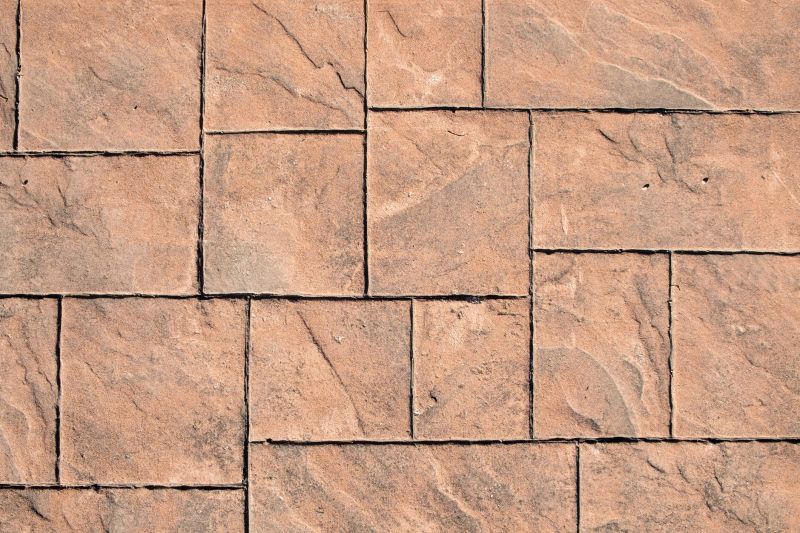Top-Rated Supplies For Stamped Concrete Service Professionals
Equip your business with trusted products that improve workflow and deliver impressive stamped concrete results.
 Stamped concrete services in Santa Rosa, CA, offer a versatile and aesthetically pleasing solution for enhancing various outdoor surfaces. This decorative technique involves imprinting patterns and textures onto freshly poured concrete, creating the appearance of materials such as brick, stone, slate, or tile. Homeowners and contractors alike appreciate stamped concrete for its durability and design flexibility, making it suitable for driveways, patios, walkways, and pool decks.
Stamped concrete services in Santa Rosa, CA, offer a versatile and aesthetically pleasing solution for enhancing various outdoor surfaces. This decorative technique involves imprinting patterns and textures onto freshly poured concrete, creating the appearance of materials such as brick, stone, slate, or tile. Homeowners and contractors alike appreciate stamped concrete for its durability and design flexibility, making it suitable for driveways, patios, walkways, and pool decks.
Types of Products For Stamped Concrete Service
Concrete Stamps with Intricate Patterns
Reusable rubber or polyurethane stamps featuring various patterns for imprinting textures onto fresh concrete surfaces.
Color Hardener and Integral Color
Color additives mixed into concrete or applied as a surface hardener to achieve vibrant and consistent coloration.
Release Agents and Powder
Products applied to molds or surfaces to prevent sticking and to enhance the appearance of stamped patterns.
Concrete Sealers and Protectants
Sealers designed to provide a protective coating that enhances color, resists stains, and prolongs surface life.
Texturing and Broom Tools
Tools used to create additional textures or to add non-slip surfaces to stamped concrete.
Color Stains and Dyes
Liquid colorants that can be applied to stamped concrete to add depth and visual interest.
Overlay and Decorative Coatings
Thin layers of decorative material applied over existing concrete to create a new textured surface.
Concrete Edging and Borders
Products designed to create clean, decorative edges around stamped concrete installations.
Joint Fillers and Crack Repair Products
Materials used to fill joints and repair cracks, maintaining the integrity of stamped surfaces.
Concrete Cleaners and Degreasers
Solutions for cleaning and preparing surfaces prior to stamping or sealing.
Popular Choices
Flexible mats with various patterns that are pressed into the concrete surface to create textured designs.
Vivid color powders and integral coloring options to enhance stamped concrete visuals.
Powdered release agents that facilitate clean stamping and add subtle color accents.
Sealers that provide a shiny finish, protecting the surface and highlighting colors.
Tools used to add additional surface textures or non-slip features after stamping.
Liquid dyes that can be applied to stamped surfaces for vibrant, customizable hues.
Decorative overlays that add texture or patterns over existing concrete surfaces.
Products to define and accentuate the edges of stamped concrete installations.
Complete kits for filling and sealing cracks in stamped concrete surfaces.
Specialized cleaners to prepare surfaces before stamping or sealing.
Materials added to concrete mix to create textured or colorful aggregate surfaces.
Additives mixed into sealers or topcoats to improve traction on stamped surfaces.
The process typically begins with the preparation of the concrete surface, ensuring it is smooth and properly cured. Once the concrete reaches the right consistency, stamps with intricate patterns are pressed into the surface to achieve the desired textured look. After the stamping process, color additives and sealers are often applied to enhance the visual appeal and provide protection against weathering and wear. The variety of patterns, textures, and coloring options allows for customization to match personal style and architectural themes.
In Santa Rosa, where outdoor living spaces are highly valued, stamped concrete offers an attractive alternative to traditional paving materials. It combines the practicality of concrete with the aesthetic qualities of natural stone or brick, often at a more accessible cost and with less maintenance. Proper installation and sealing are crucial to ensure longevity and maintain the appearance over time. Selecting the right products and techniques can significantly influence the final result, making it important to consider quality materials and experienced professionals for the job.
Key Buying Considerations
- Compatibility of products with existing concrete surfaces or new installations.
- Durability and resistance to weathering, staining, and wear over time.
- Ease of application and the level of skill required for proper use.
- Availability of pattern options and customization features.
- Compatibility of coloring products with stamping tools and techniques.
- Type of sealer or protective coating to match desired finish (matte, glossy, satin).
- Environmental conditions during application, such as temperature and humidity.
- Brand reputation and product reviews to ensure quality and consistency.
- Cost-effectiveness considering long-term maintenance and durability.
- Ease of cleaning and maintenance after installation.
- Compatibility with existing surfaces if overlays or repairs are needed.
- Availability of technical support or professional guidance.
- Time required for curing, sealing, and finishing processes.
- Safety precautions and handling instructions for chemical products.
- Availability of sample kits or demonstration options before purchase.
